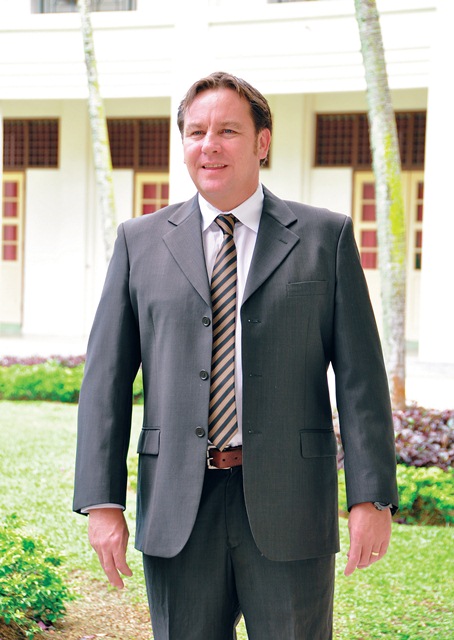
Established in 1991, Kolej Tuanku Ja’afar in Negri Sembilan, is the oldest, co-educational, British-style boarding school in Malaysia. It quickly became renowned for its outstanding faculty, rigorous academic programmes, its graduating students being accepted into some of the most prestigious global universities, and for its lush tropical grounds spread over 80 acres. It served only secondary students up until last September, when it opened its new Primary School for students aged 3-11.
I recently had the pleasure of meeting with Mr Justin Durling, who was appointed Head of Primary in the early stages of the planning construction, and who oversaw the successful opening of the new Primary School last September 2013.
Mr Durling comes to KTJ as a wellexperienced educator who was most recently at the prestigious St. Christopher’s International Primary School in Penang, and prior to that in Ecuador and Thailand. A native of New Zealand, his considerable experience has prepared him well for his new posting. I asked him about his educational philosophies and what he felt were the most crucial elements of a primary school education, as well as how he has integrated his goals into new Primary School.
“Core to my vision of what we as educators should do for students, and in keeping with the overall mission of KTJ itself, is the belief that all education must be centred around the student,” he explains. “With this in mind, we build a student profile for every child who joins us. We do this to gain a thorough understanding of each child’s strengths, weaknesses, and personality, as well as potential academic, social, emotional, and physical abilities – both latent and obvious – and then we can create their learning goals and pace around this.”
The school uses the National Curriculum for England and Wales alongside the International Primary Curriculum, which allows children to develop at their own pace and acquire the basic skills to become curious and lifelong learners. The Early Years Foundation Stage, or EYFS, for children aged three to five, adds structure and enthusiasm to the child’s learning experiences.
There are four guiding principles in the EYFS which are relevant to Mr Durling’s educational philosophies. Succinctly put, they are that every child is constantly learning, and can be shaped into being resilient, capable, and self-assured; that children learn to be strong and independent thinkers through positive relationships; that young children learn and develop to their optimum in enabling environments; and that children each learn at different rates with different abilities.
Mr. Durling feels fortunate to have been involved from the earliest stages of the planning for the construction of the Primary School. He was able to ensure that the classrooms are spacious even though 20 is the maximum number of children in each class. This allows KTJ to boast a teacher-to-student ratio of 1:7 across both schools, which further reflects their student-centred, rather than profit-centred philosophy.
The large rooms can accommodate several Learning Stations at which the children receive small group attention from the teacher and the full time teacher’s assistant. Also incorporated are a full array of Information Communications Technology (ICT) such as Wi-Fi, smart boards, iPads, and laptops. However, he says that printed materials such as books and workbooks will still be utilized.
I asked him about the teachers who by the very definition of his vision and goals, must be highly skilled especially with the goal of bringing out a student’s strengths and talents. He proudly says that a full 100% of the Year 1–6 teachers at the new Primary School are from the UK and all have at least a Bachelor’s Degree plus a Post-graduate Diploma in Education, and a minimum of three years’ primary school teaching experience in their home country. Each classroom also has a full-time teaching assistant.
The Primary School will operate as a day school for the next few years, rather than as a boarding school. Most of the children come from the surrounding area of Seremban, Nilai, Kajang, and Kuala Lumpur. “The Board of Governors saw a great need to open a Primary School because the communities around KTJ had expanded and developed so much,” Mr Durling explains, “including the growth of KL and the lifting of quotas for local Malaysians to be able to attend international schools.”
“All children who graduate from the Primary School will be able to make a very easy transition into the Secondary School at KTJ, as the same methodologies and thematic-based curriculum is utilised in both schools. And the fact that many of the children come from expat families means they must be able to successfully integrate into any school, whether in Malaysia or overseas. I strongly believe that our Primary School prepares every child we have here for that kind of transition,” he declares.
“The Primary School at KTJ stands for outstanding quality education with a student-centred environment that is very open to parents. The children here are happy and have fun while learning essential skills for the rest of their lives.”
Source: The Expat Magazine April 2014
Read More Education Articles:
- Nexus Gets Recognized as a Top IPC School
- GIS Welcomes New Zealand MP and Alumni Melissa Lee during New Zealand Week Celebrations
- Epsom College Countdown Begins for Opening in September 2014
What are your thoughts on this article? Let us know by commenting below.No registration needed.


















